The agricultural practice of “three sisters” has been around for thousands of years. It refers to the technique of companion planting, in which three different crops are planted amongst each other; forming a symbiotic relationship. The most common combination is pumpkin, corn, and some form of runner or pole beans. The corn provides a lattice for the beans, the beans give nitrogen to the soil, and the pumpkin leaves shade the ground and help deter pests. Originating in Northern Mexico and Central America, this practice was eventually adopted all over North America and became the foundation of the agricultural society for many Native American tribes.
Three Sisters also refers to a brand new roll and write game by Ben Pinchback and Matt Riddle, designers of Fleet, Floating Market, Piepmatz, and my personal gold standard for roll and write games Fleet: The Dice Game. Can Three Sisters supplant Fleet: The Dice Game as my new favorite or will it wither on the vine? Let’s find out!
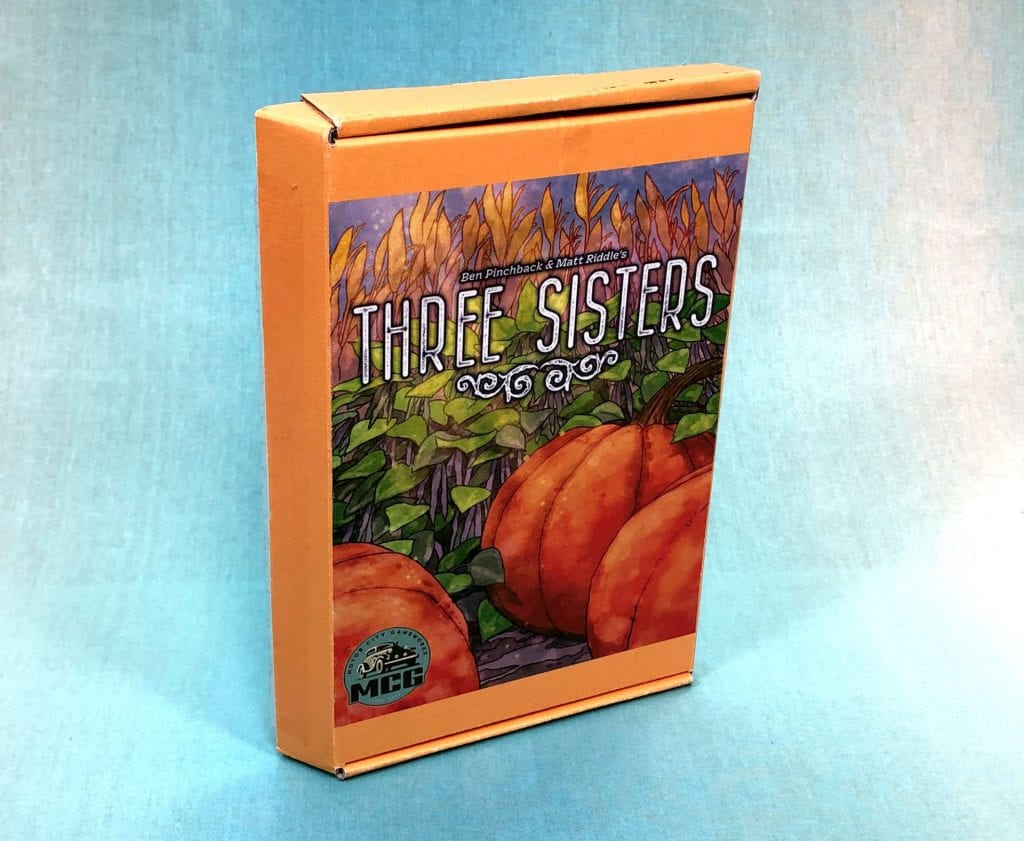
Three Sisters Overview
Three Sisters is a thematic roll and write game in which players grow pumpkins, corn, beans, and perennials in their gardens, upgrade their equipment, grow fruit, raise bees, and take it all to the farmers market. Players have 8 turns to accomplish these goals by using a shared dice pool, combo chaining, bonus actions, and a little bit of luck (this is a dice game after all). If you’d like to find out how to play the game, keep reading. Or you can jump to the bottom and hear my final thoughts on Three Sisters.
How to Play Three Sisters
The setup time for Three Sisters is minimal. The box includes two pads of player sheets (one sheet displays your garden, the other sheet displays your shed, orchards, compost heap, and your apiary – where you keep your bees). It also includes a main board, 6 dice, and a few wooden pieces for round tracking.
Give each player one sheet from each pad, set up the dice pool based on your player count (4 dice for 2 players, 5 dice for 3, and all 6 dice for 4). Place the main board between all players, place the Farmer Edith pawn on the action space with the gold push pin, set the round tracker onto round 1, and select a first player – giving them the first player marker.
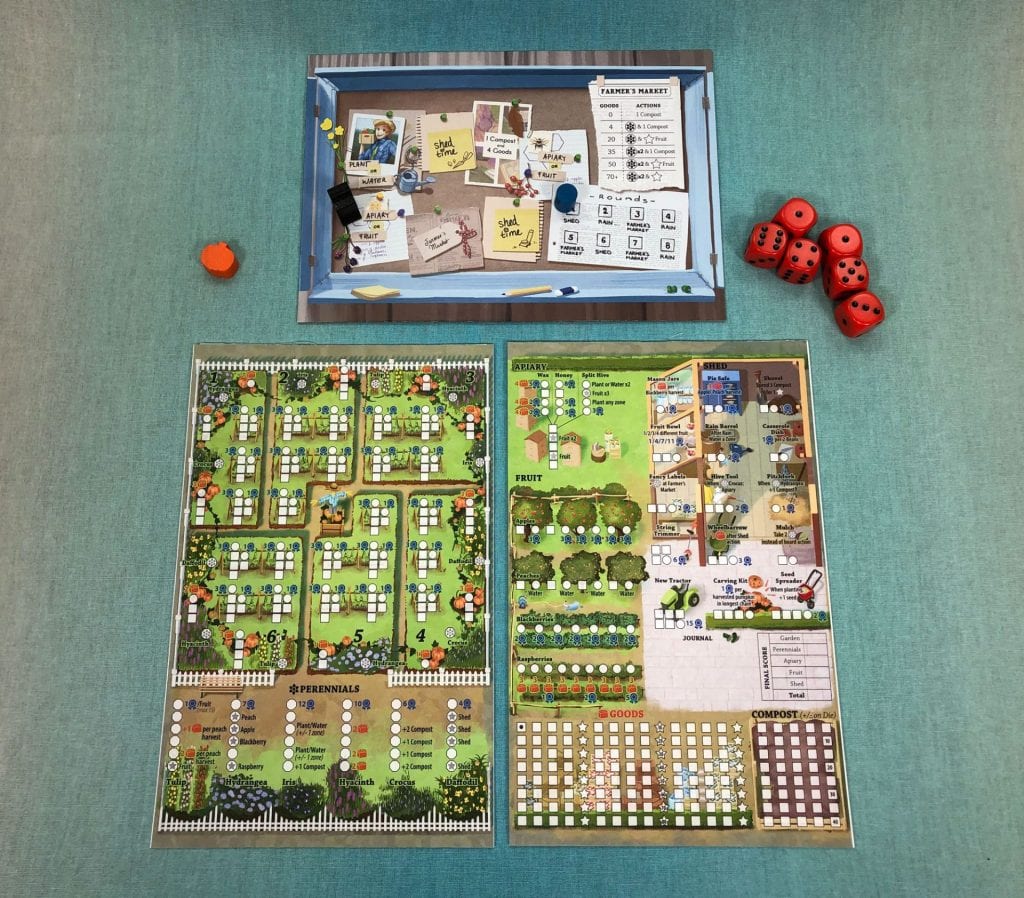
Playing a Round of Three Sisters
At the beginning of the round the active player will roll all of the dice then group them by value. Place each group of dice onto the board in a clockwise direction, with the lowest group of dice placed on the same space as the Farmer Edith marker. After all dice are placed, advance the Farmer Edith marker clockwise to the first empty space (in the example below that would be the Apiary or Fruit space.
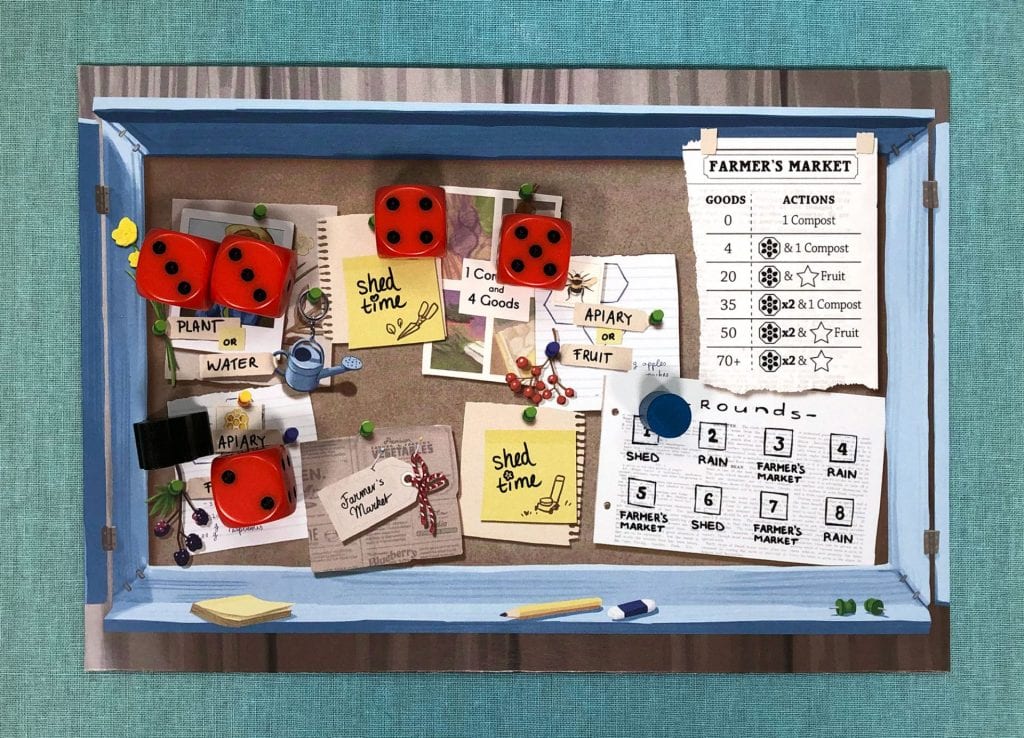
In turn order players will each select a single die and perform a garden action and a rondel action based on the die face and its position on the rondel (more on those in just a moment). After all players have selected a die and performed their actions, identify the first die clockwise from Farmer Edith’s current position, then all players will perform the garden and rondel actions for that die. After all players have completed the second die actions, the end of round event will trigger. These events are listed on the main board and will always be beneficial.
Garden Actions
When performing garden actions players will identify the zone matching the die face they selected and either “plant” two times anywhere within that zone, or water the entire zone. When planting, players will mark off the lowest box or circle for a single corn, bean, or pumpkin plant in that zone. The only restriction is that beans cannot be planted until the corn immediately next to it has at least two marks. Players may optionally use compost to adjust the value of the die up or down by one to target other areas of the garden.
When watering the zone, fill in the next box in every crop which has already been planted. If you complete a pumpkin during the water action, immediately add the corresponding number of goods to your sheet. After completing a pumpkin if you discover that you’ve completed both pumpkin plants on either side of a perennial, then you automatically fill in that perennial, and mark the lowest box for that perennial at the bottom of the garden sheet.
Rondel Action
The rondel actions are as follows.
- Plant or Water – Perform the plant action or water action in the zone matching the die face. Selecting this action means you’ll get to do another garden action in this round.
- Shed time – Fill in the next empty box in any shed item
- 1 Compost & 4 Goods – Fill in the next open box in both the goods and compost tracks.
- Apiary or Fruit – Fill in the next open box in any fruit or apiary track.
Event Phase and the End of the Round
After all actions have been performed the event action is performed by all players, after which the next round begins – unless it’s the end of the game, at which point the scores are totalled and the winner is determined. The three different events are listed below.
- Rain – Perform the water action in every zone in your garden.
- Shed time – Fill in the next empty box in any shed item.
- Farmers market – Using the chart at the top right corner of the main board, players will receive bonuses based on the total number of goods they have.
After all of the scores are tallied, the player with the most points wins the game.
Final Thoughts on Three Sisters
So let’s get this out of the way first. Three Sisters is heavily influenced by Fleet: The Dice Game. So much so that in my first play I thought to myself “the garden sheet is like the fishing area, the shed sheet is like the town sheet”, etc. But it was only after subsequent plays that I started realizing that while there are similarities, Three Sisters is even more thematic than Fleet: The Dice Game.
Beans can’t be planted until corn is high enough, planting pumpkins can chain together with flowering perennials to provide not only a beautiful garden, but help improve your perennials and earn more bonuses. Actions you take in Three Sisters have a trickle down effect throughout the rest of the game. Choices made early on can reap massive rewards, or put yourself into a bit of a pickle in later rounds.
Bonus Actions and Combo Chaining
One of the main attractions, for me at least, to Three Sisters is the concept of bonus actions. By performing various common actions, players will earn bonus actions which can be used in various places on the board (except for the garden). Players can earn various “free” bonus actions by filling in stars on the goods track, or “limited” bonus actions by filling in spaces in other areas. More importantly bonus actions can be strung together to perform powerful chains of actions. It’s a bit exhilarating when you earn a single bonus action which can allow you to perform 3 or 4 extra actions because of clever chaining.
Shed Time, Apiary, and The Orchard
The shed is the source of many powerful upgrades to your engine. My personal favorite is the seed spreader which allows you to plant three times instead of two when taking the plant action. But you can also upgrade your fruit harvest, earn more checks when taking a perennial action, improve your pumpkin harvest, and even receive a straight up 15 points for a new tractor. It’s beyond the scope of this review to talk about all of the possibilities here, but suffice it to say that Matt and Ben, the designers of Three Sisters, want to offer multiple ways to earn points based on how you want to play.
The apiary and the orchard can also provide valuable points and combos to attentive players. Upgrading your apiary can help you improve your fruit harvest, earn points from honey gathering, and even help you improve your garden by providing water or plant actions.
What’s that Smell? Oh, it’s Just the Compost Heap
While I’ve quite enjoyed all of my plays of Three Sisters, I think there are still some areas that can be tightened up. In classic “point salad game” fashion there are many, many, ways for players to earn points. While on the surface this sounds really exciting, it didn’t pan out like expected in our plays. The largest source of your point totals will come from your garden, there are 24 pairs of corn (3 points) and beans (1 point) which means that if you’re able to get all of them you can earn 96 points just in your garden. So you’re heavily incentivized to plant, water, and do anything you can to check as many boxes as you can, in every zone of your garden. I wonder if the point totals in the garden could be slightly reduced to balance out other areas of the player sheets.
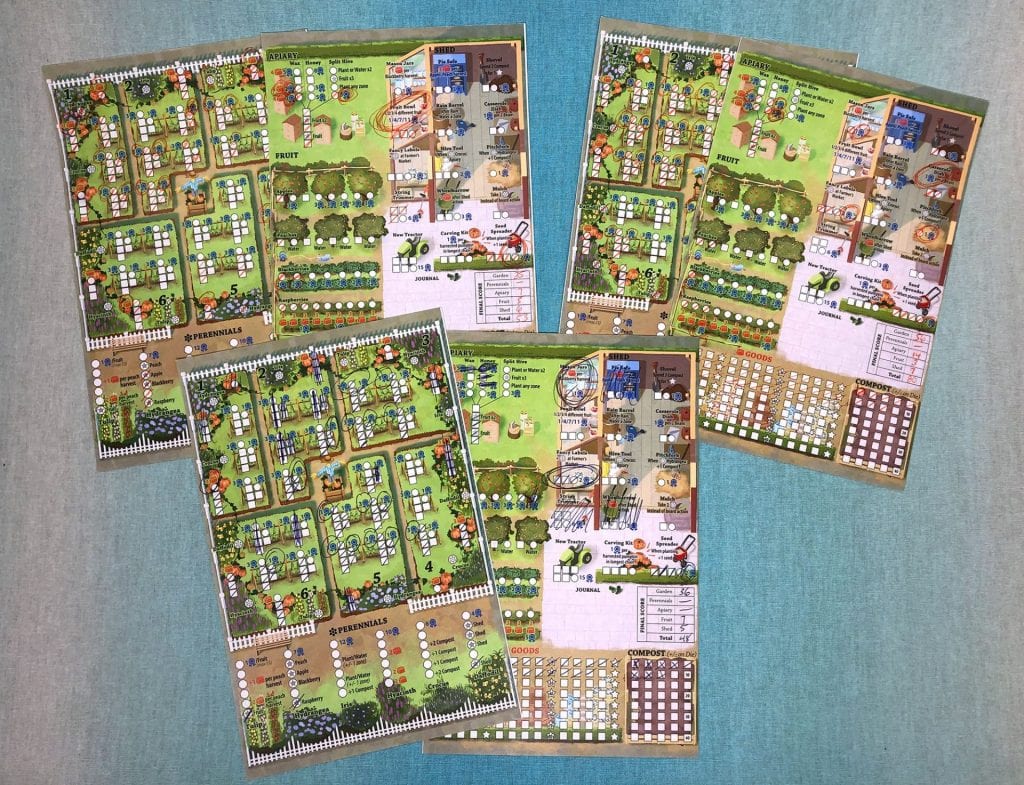
Plant or Water, Apiary or Fruit, and Shed Time were the most commonly picked rondel actions in our plays, with no player ever picking the Farmers Market unless forced to by arrangement. The 1 compost and 4 goods rondel space was never picked as it’s simply not as powerful as the other options. I might even go so far as to say it’s a wasted space on the main board.
In our plays not one player ever earned points from perennials, which is a shame because they provide valuable bonus actions, and can be a source of lots of points. The problem is that getting there is just too hard to accomplish, forcing you to sacrifice other more valuable areas of the board in the hopes you might earn 12 points from Iris, or 10 points from Hyacinth (in addition to the bonus actions you’d get along the way). Perhaps the number of spaces in each track could be reduced to make it more enticing as a path to points?
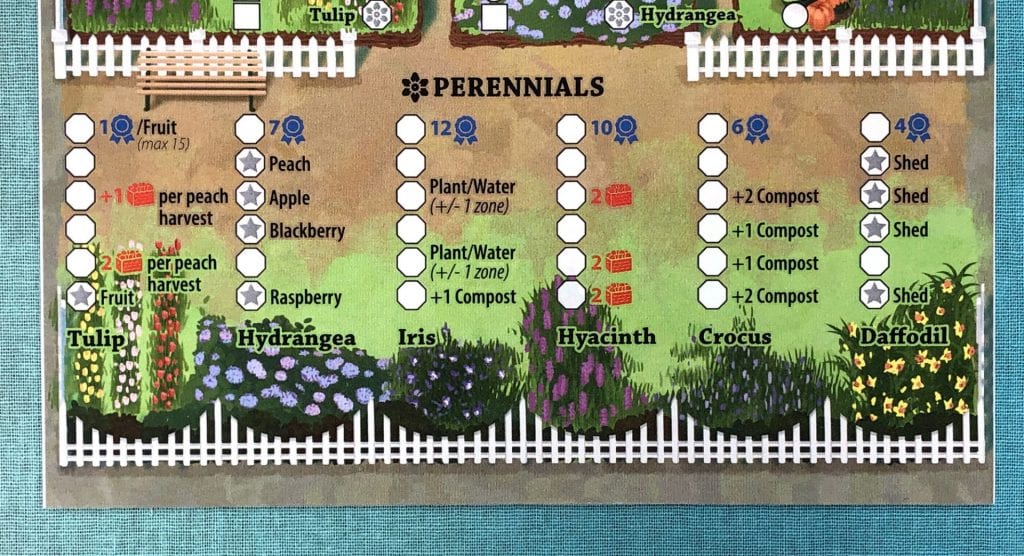
Will I like Three Sisters?
If you take away anything from this review, it should be that Three Sisters is a deeply thematic and strategic roll and write, and a great game. Ben and Matt have clearly put a lot of time and research into the gameplay in order for your choices to have meaning and impact. There’s never a time in which you say “I don’t understand why choice A gives me result B”. In fact one of the things I find most fascinating and compelling about Three Sisters is that it isn’t just a theme they picked, they’re living it. This game was influenced by Ben’s very own garden in which he does these things for his family! My review copy even included homemade beeswax lip balm made from bees raised by Ben. That’s amazing!
So head over to Kickstarter and back Three Sisters today. Support indie game design, try out new and unique game themes, and get an excellent roll and write game!


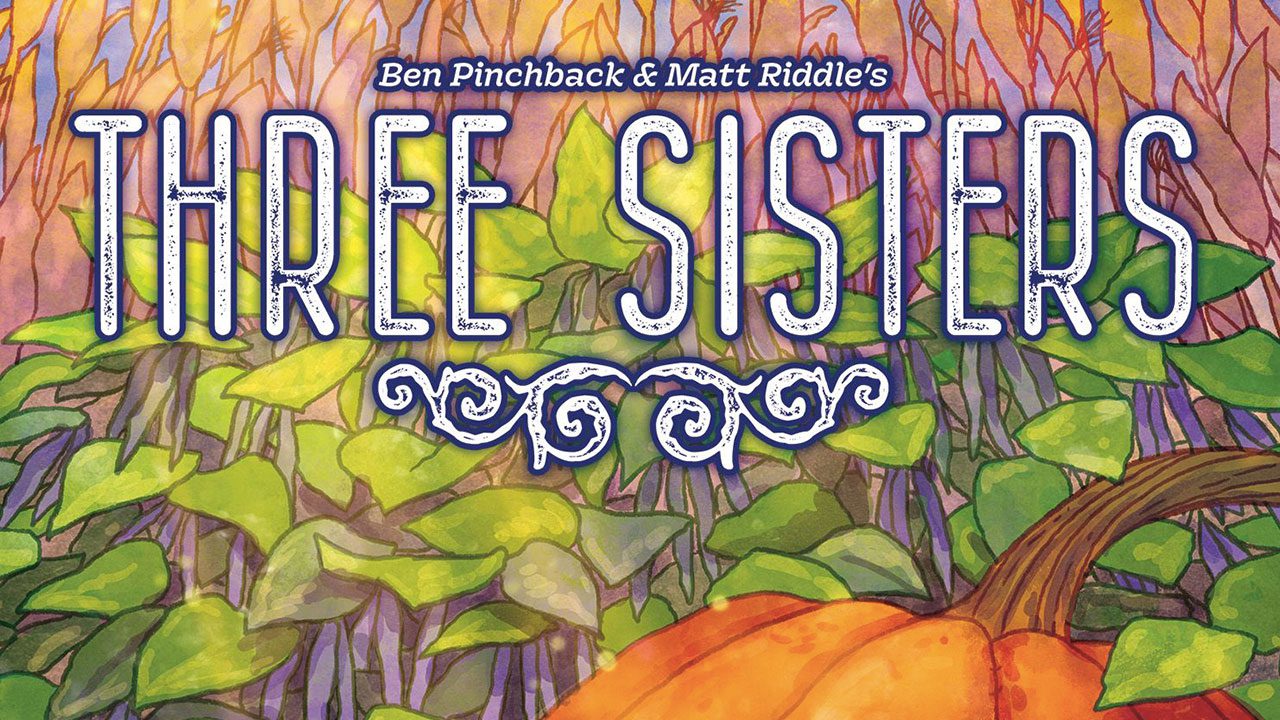

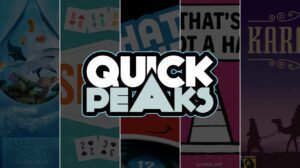






bonjour et Merci pour la règle de ce jeu en français.
Je suis moi aussi passionnée de jeu de société. En ce moment ce sont les roll and write. JE joue beaucoup en solo car je suis coincée chez moi pour cause de longue maladie handicapante. Mais les spécialistes s’accordent tous à dire que les jeux et la lecture peuvent ralentir la dégénérescence de la mémoire, alors je joue et je lis beaucoup, mais beaucoup seule malheureusement. Puis je vous demander si vous pouvez m’envoyer un scan des feuilles de score du jeu three sisters s’il vous plait car il n’est plus dispo nulle part en France même plus chez l’éditeur iello.
Je vous remercie d’avance pour votre aide.
christelle.zirnhelt@hotmail.fr